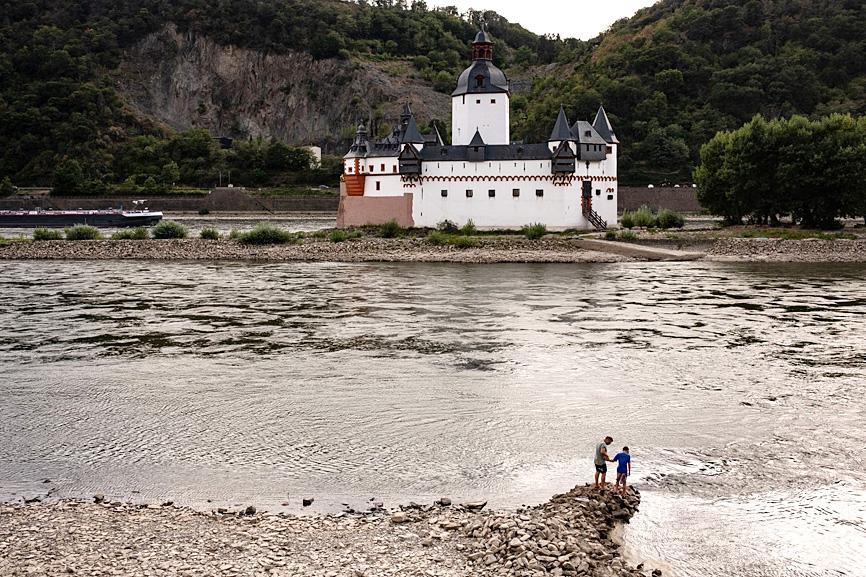The Rhine River is set to become virtually impassable at a key waypoint in Germany, as shallow water chokes off shipments of energy products and other industrial commodities along one of Europe’s most important waterways.
The marker at Kaub, west of Frankfurt, is forecast to drop to the critical depth of 40cm tomorrow, the German Federal Waterways and Shipping Administration said.
At that water level, barges that haul everything from diesel to coal are effectively unable to transit the river. The water level is forecast to fall as low as 37cm the following day.

Photo: Bloomberg
Europe is facing its worst energy crisis in decades as Russia curbs natural gas flows, with regional tensions high over its invasion of Ukraine. That has sent prices soaring and pushed companies to use more oil and coal instead.
The energy crunch has spilled over into the broader economy, sending factory costs surging and threatening to push some of the continent’s largest economies into recession.
Now a climate crisis is adding to the region’s energy woes.
Used by vessels to haul vital commodities, the Rhine snakes about 1,300km from its source higher in the Swiss Alps through some of Europe’s most important industrial zones before emptying into the North Sea near Rotterdam.
Companies including chemicals giant BASF SE and steelmaker Thyssenkrupp AG rely on the river to supply major industrial plants with fuels and raw materials.
A mix of glacial run-off and rain feeds the river, but contributions from glaciers have dwindled in recent years as summer melting outpaces winter ice formation due to climate change.
Below-average snowfall last winter and continued glacial attrition mean the waterway is particularly likely to fall to crisis levels, Switzerland’s Federal Office of Meteorology and Climatology said.
When the marker at Kaub hits 40cm or less, it becomes uneconomical for most barges to sail any further, a representative of Germany’s Federal Institute of Hydrology has said.
That effectively cuts off the flow of goods beyond the waypoint.
Shipments have already been hampered for weeks, with low water limiting how much barges can carry. Some vessels are specifically designed for shallow water, so traffic would not completely halt. The measured water level is not the actual depth of the river, but rather a marker for navigability.
Still, dwindling water levels at Kaub could cause planning headaches for BASF and utilities EnBW AG and Uniper SE — the latter of which recently received a US$17 billion bailout from the German government to prevent a collapse of its energy network.
While the companies would still be able to supply factories and power plants by road or rail, those modes of transport are significantly more expensive, leading to a squeeze on margins.
Further downriver, Thyssenkrupp is closely monitoring water levels at Duisburg, near Cologne. The river depth there currently stands at 171cm, with 150cm seen as the level that makes it uneconomical to transport materials such as coking coal and iron ore by barge.

Republican US lawmakers on Friday criticized US President Joe Biden’s administration after sanctioned Chinese telecoms equipment giant Huawei unveiled a laptop this week powered by an Intel artificial intelligence (AI) chip. The US placed Huawei on a trade restriction list in 2019 for contravening Iran sanctions, part of a broader effort to hobble Beijing’s technological advances. Placement on the list means the company’s suppliers have to seek a special, difficult-to-obtain license before shipping to it. One such license, issued by then-US president Donald Trump’s administration, has allowed Intel to ship central processors to Huawei for use in laptops since 2020. China hardliners

A top Vietnamese property tycoon was on Thursday sentenced to death in one of the biggest corruption cases in history, with an estimated US$27 billion in damages. A panel of three hand-picked jurors and two judges rejected all defense arguments by Truong My Lan, chair of major developer Van Thinh Phat, who was found guilty of swindling cash from Saigon Commercial Bank (SCB) over a decade. “The defendant’s actions ... eroded people’s trust in the leadership of the [Communist] Party and state,” read the verdict at the trial in Ho Chi Minh City. After the five-week trial, 85 others were also sentenced on

‘DELUSIONAL’: Targeting the families of Hamas’ leaders would not push the group to change its position or to give up its demands for Palestinians, Ismail Haniyeh said Israeli aircraft on Wednesday killed three sons of Hamas’ top political leader in the Gaza Strip, striking high-stakes targets at a time when Israel is holding delicate ceasefire negotiations with the militant group. Hamas said four of the leader’s grandchildren were also killed. Ismail Haniyeh’s sons are among the highest-profile figures to be killed in the war so far. Israel said they were Hamas operatives, and Haniyeh accused Israel of acting in “the spirit of revenge and murder.” The deaths threatened to strain the internationally mediated ceasefire talks, which appeared to gain steam in recent days even as the sides remain far

RAMPAGE: A Palestinian man was left dead after dozens of Israeli settlers searching for a missing 14-year-old boy stormed a village in the Israeli-occupied West Bank US President Joe Biden on Friday said he expected Iran to attack Israel “sooner, rather than later” and warned Tehran not to proceed. Asked by reporters about his message to Iran, Biden simply said: “Don’t,” underscoring Washington’s commitment to defend Israel. “We are devoted to the defense of Israel. We will support Israel. We will help defend Israel and Iran will not succeed,” he said. Biden said he would not divulge secure information, but said his expectation was that an attack could come “sooner, rather than later.” Israel braced on Friday for an attack by Iran or its proxies as warnings grew of